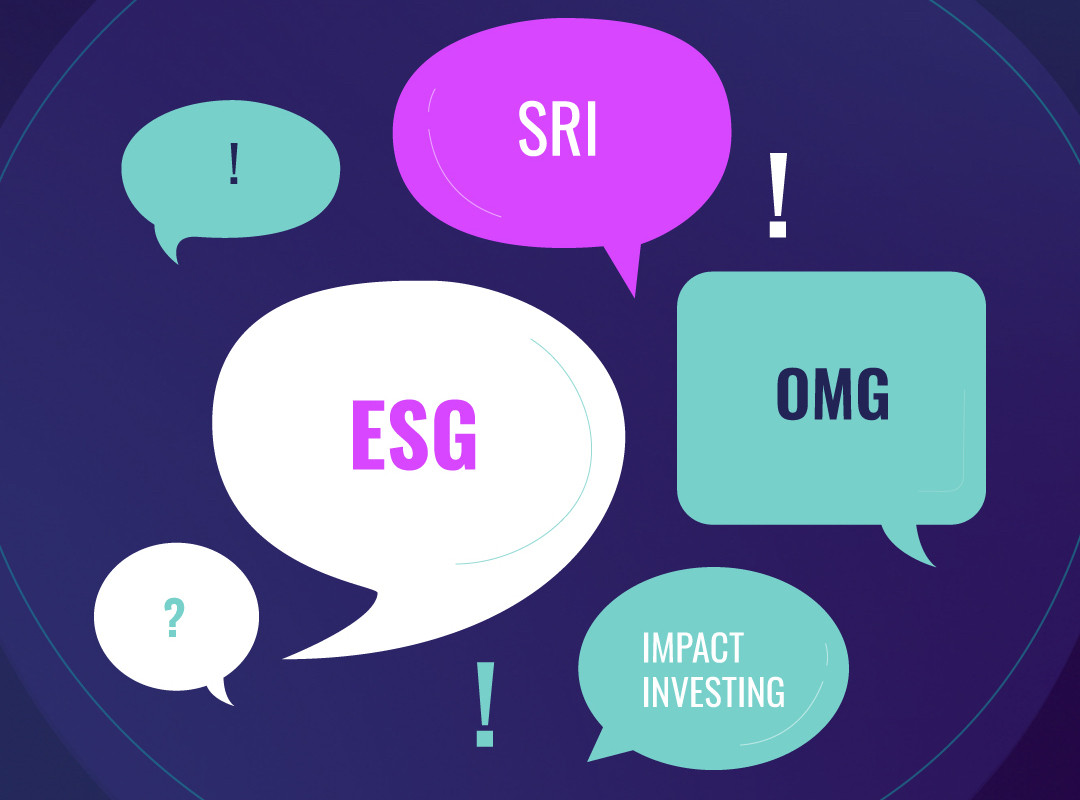 Back to Learn page
Back to Learn page

ESG vs SRI: What Do All the Terms Mean?
Are you an investor who cares not only about the performance of your portfolio, but also how your investments affect the environment, society, or humanity as a whole?
If you do, you’re not alone. There are many investors who invest based on their own morals, what they think is ethical, or to achieve a certain social goal. In fact, this type of investing is so popular that there are a handful of different terms that refer to the practice of aligning your investments with your values.
You may have heard of impact investing, sustainable investing, socially-responsible investing, or ESG, but what do all these terms actually mean? And how do they differ?
Let’s define some of the commonly used terms:
ESG — Stands for Environmental, Social, and Governance. A framework for assessing companies beyond solely financial data, by looking at that company’s impact on the environment, its impact on society, and how that company is organized. ESG is about better understanding a company by taking into account this information.
ESG investing — Involves incorporating ESG data in order to make investment decisions. Traditionally, ESG investing is viewed as a form of risk management, where ESG is used to identify companies that are managed sustainably and avoid those that could face regulatory scrutiny. However, ESG investing is often grouped together with socially responsible investing or sustainable investing — even though technically those refer to different strategies.
Ethical investing — Using your personal code of ethics to determine what to invest in. This differs from investor to investor. One person may think ethical investing involves divesting from companies that test on animals, while another person may not care about animal testing and instead focus on avoiding companies that benefit from child labor.
Impact investing — According to the Global Impact Investing Network, impact investing refers to making investments “with the intention to generate positive, measurable social and environmental impact alongside a financial return.”
Impact investing is a broad term, but in order to qualify as impact investing the investor should have the desire to create a positive, the ability to measure that impact, the evidence to inform that investment decision, and the goal of also generating returns in the end.
Socially responsible investing (SRI) — Involves investing in something based on how that investment impacts the environment, society, or the greater good. The concept of SRI has been around for decades (at least) and is sometimes used interchangeably with ethical investing and sustainable investing.
Sustainable investing — According to Harvard Business School, sustainable investing refers to “a range of practices in which investors aim to achieve financial returns while promoting long-term environmental or social value” — emphasis on long-term.
Sustainable investing often is associated with investing in green energy or environmentally-friendly practices because the word “sustainable” is often used in that setting
Values-based investing — Similar to ethical investing, values-based investing involves making investment decisions based on a person’s own set of values. Sometimes those values reflect a person’s morals or religion, and other times they reflect a more generalized set of beliefs. Regardless of what those beliefs are, a values-based approach depends on the individual investor.
Which approach is best for you?
After going through all of these terms, you may have noticed that there are a lot of similarities. Sometimes the differences between these approaches depend on the intention or end goal, other times it just comes down to semantics.
Hopefully, next time you hear one of these terms get tossed around you’ll have a better understanding of what it means. This understanding may help you make your own investing decisions going forward.
* * *
The views expressed are those of the author at the time of writing, are not necessarily those of the firm as a whole and may be subject to change. The information contained in this advertisement is for informational purposes and should not be regarded as an offer to sell or a solicitation of an offer to buy any. It does not constitute a recommendation or consider the particular investment objectives, financial conditions, or needs of specific investors. Investing involves risk, including the loss of principal. Past performance is not indicative or a guarantee of future performance. We do not provide tax, accounting, or legal advice to our clients, and all investors are advised to consult with their tax, accounting, or legal advisers regarding any potential investment. The information and any opinions contained in this advertisement have been obtained from sources that we consider reliable, but we do not represent such information and opinions are accurate or complete, and thus should not be relied upon as such. This is particularly true during periods of rapidly changing market conditions. Securities offered through Fennel Financials, LLC. Member FINRA SIPC.

Expand your knowledge further

Greenwashing is a superficial and sometimes misleading way companies claim sustainability.

Some investors have a hypothesis that ESG investments generate stronger, more sustainable returns over the long term.

Active ownership could help ESG investors push for more impactful change.

What does impact investing look like in practice?

Proactive companies prioritize ESG in their business practices.

Social impact doesn't always happen in a vaccum.

An ESG index can help you track the performance of certain ESG-vetted companies over time.

Let's take a look back at some of the things that happened during last year's AGM season.

Want to invest in bonds while having a positive impact on the world?

A growing number of future business leaders are learning about sustainability in their MBA programs.
Take back the power of your investment
